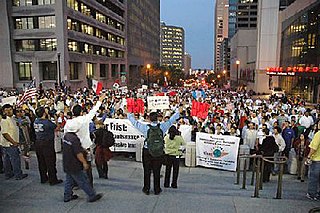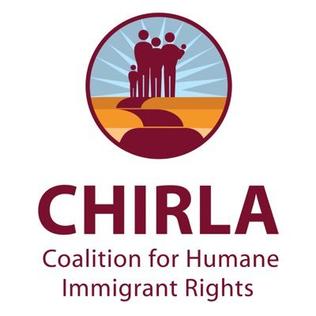
Act Now to Stop War and End Racism (ANSWER), also known as International A.N.S.W.E.R. and the ANSWER Coalition, is a United States–based protest umbrella group consisting of many antiwar and civil rights organizations. Formed in the wake of the September 11th attacks, ANSWER has since helped to organize many of the largest anti-war demonstrations in the United States, including demonstrations of hundreds of thousands against the Iraq War. The group has also organized activities around a variety of other issues, ranging from the Israel/Palestine debate to immigrant rights to Social Security to the extradition of Luis Posada Carriles.

California Proposition 187 was a 1994 ballot initiative to establish a state-run citizenship screening system and prohibit undocumented immigrants from using non-emergency health care, public education, and other services in the State of California. Voters passed the proposed law at a referendum on November 8, 1994. The law was challenged in a legal suit the day after its passage, and found unconstitutional by a federal district court on November 11. In 1999, Governor Gray Davis halted state appeals of this ruling.
Immigration reduction refers to a social movement in the United States that advocates a reduction in the amount of immigration allowed into the country. Steps advocated for reducing the numbers of immigrants include advocating stronger action to prevent illegal entry and illegal immigration, and reductions in non-immigrant temporary work visas. Some advocate a tightening of the requirements for legal immigration requirements to reduce total numbers, or move the proportions of legal immigrants away from those on family reunification programs to skills-based criteria. What separates it from others who want immigration reform is that reductionists see immigration- or one of its forms- as being a significant source of social, economic, and environmental problems, and wish to cut current immigration levels.

In 2006-2007, millions of people participated in protests over a proposed change to U.S. immigration policy. These large scale mobilizations are widely seen as a historic turn point in Latino politics, especially Latino immigrant civic participation and political influence, as noted in a range of scholarly publications in this field. The protests began in response to proposed legislation known as H.R. 4437, which would raise penalties for illegal immigration and classify illegal aliens and anyone who helped them enter or remain in the US as felons. As part of the wider immigration debate, most of the protests not only sought a rejection of this bill, but also a comprehensive reform of the country's immigration laws that included a path to citizenship for all illegal immigrants.

The Great American Boycott, also called the Day Without an Immigrant, was a one-day boycott of United States schools and businesses by immigrants in the United States which took place on May 1, 2006.
The National Alliance for Immigrants' Rights is an organization advocating legal status for all illegal immigrant workers in the United States pending Congressional enactment of a comprehensive immigration reform. It was founded in a conference held in Chicago on August 11–13, 2006, attended by about 700 people, most of whom had been involved in the Great American Boycott earlier in 2006.
The Leadership Conference on Civil and Human Rights, formerly called the Leadership Conference on Civil Rights, is an umbrella group of American civil rights interest groups.
The National Korean American Service & Education Consortium is a national service, advocacy and education organization for two non-profit multi-issue grassroots local community centers: the Korean American Resource & Cultural Center in Chicago and the Korean Resource Center in Los Angeles. NAKASEC is based in Los Angeles and a D.C. office opened in late 2008.

The Coalition for Comprehensive Immigration Reform (CCIR), also known as CCIR/NAOC or New American Opportunity Campaign (NAOC) is a non-profit immigrant rights advocacy organization based in Washington, DC, established in 2003 to pass comprehensive immigration reform. It was instrumental in the 2004 Immigrant Workers Freedom Ride, modeled after the Freedom Rides of the Civil Rights Movement and acts as an umbrella organization for a number of national and local immigrant rights organizations for advocacy and coalition building.

Community Change, formerly the Center for Community Change (CCC), is a progressive community organizing group active in the United States. It was founded in 1968 in response to civil rights concerns of the 1960s and to honor Robert F. Kennedy. The organization's stated mission is "to build the power and capacity of low-income people, especially low-income people of color, to change their communities and public policies for the better." Community Change has received funding from the Democracy Alliance and the Tides Advocacy Fund.

The Coalition for Humane Immigrant Rights, also known as CHIRLA, is a Los Angeles county-based organization focusing on immigrant rights. While the organization did evolve from a local level, it is now recognized at a national level. The Coalition for Humane Immigrant Rights of Los Angeles organizes and serves individuals, institutions and coalitions to build power, transform public opinion, and change policies to achieve full human, civil and labor rights. The Coalition for Humane Immigrant Rights of Los Angeles also has aided in passing new laws and policies to benefit the immigrant community regardless of documented status.
Politics is the process by which groups of people make decisions. Although the term is generally applied to behavior within civil governments, politics is observed in all human group interactions, including corporate, academic, and religious institutions. Politics consists of "social relations involving authority or power. The definition of "politics" from "The Free Dictionary" is the study of political behavior and examines the acquisition and application of power. Politics study include political philosophy, which seeks a rationale for politics and an ethic of public behavior, and public administration, which examines the practices of governance.
The Kentucky Coalition for Immigrant and Refugee Rights (KCIRR) is a loosely organized Kentucky, United States grassroots community group based in Lexington, Kentucky but with members throughout the state.

Andrés Useche is a Colombian American writer, film director, graphic artist, singer-songwriter and activist.

Jewish Council on Urban Affairs (JCUA) is a nonprofit organization based in Chicago that mobilizes the Jewish community of the region to advance racial and economic justice. JCUA partners with diverse community groups across the city and state to combat racism, antisemitism, poverty and other forms of systemic oppression, through grassroots community organizing, youth education programs, and community development.
The Central American Resource Center (CARECEN) are two community-based organizations that seek to foster the comprehensive development of the Latino community. CARECEN in the Washington, D.C. metropolitan region was founded in 1981 to protect the rights of refugees arriving from conflict in Central America and to help ease their transition by providing legal services. CARECEN provides direct services in immigration, housing and citizenship while also promoting empowerment, civil rights advocacy and civic training for Latinos. Another CARECEN is also located in Los Angeles and which was established two years after the D.C. location.
Many immigrant communities in the United States are engaged in community organizing activities. Of over 50 million immigrants living in the United States many may experience exploitation in the workforce and different forms of discrimination and challenges in their lives. Many voluntary associations that seek to meet the needs of immigrants utilize community organizing methods aiming to mobilize and empower them and advocate for them.
The Alaska Immigration Justice Project(AIJP) is a non-profit agency that provides low-cost immigration legal assistance to immigrants and refugees in all immigration applications including citizenship, permanent resident status, work permits, asylum, family-based petitions and immigration petitions for immigrant victims of domestic violence, sexual assault and human trafficking.
The We Belong Together Campaign is anchored by the National Domestic Workers Alliance and the Asian Pacific American Women's Forum along with other groups throughout the United States. We Belong Together is an initiative that is taking place all over the United States, which seeks to bring together women from across the nation to bring attention to immigration laws that impact women. The campaign also gathers women together to fight for immigration reform. This campaign was formed to address issues that are not taking into account the experiences of women, who make up the majority of the immigrant population in the United States. The campaign offers a gender-based analysis and focuses on the importance of maintaining nuclear families together.
The Hispanic Federation (HF) is a U.S based non-governmental organization focused on supporting Hispanic communities through local, state, and national advocacy. The Federation was founded in New York City in 1990 by a small group of Latino leaders, establishing initiatives to advocate for the interests of the Hispanic community and has expanded to establish programs, and policies in 16 states. The organization's objective is to empower and advance the Hispanic community primarily through service pillars, membership services, advocacy, and community programs. The Federation has formed relationships with a network of 100 Latino grassroots nonprofits, as well as collaborating with organizations, government officials, and private sector partners to enact systemic change related to a variety of socioeconomic issues for Hispanic communities. The Federation has gained national recognition for its work in areas of education, health, immigration, economic empowerment, civic engagement, environment, and organizational development to strengthening Latino institutions to ultimately increase the quality of life within Hispanic communities.








